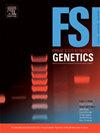MixDeR: A SNP mixture deconvolution workflow for forensic genetic genealogy
IF 3.1
2区 医学
Q2 GENETICS & HEREDITY
引用次数: 0
Abstract
The generation of forensic DNA profiles consisting of single nucleotide polymorphisms (SNPs) is now being facilitated by wider adoption of next-generation sequencing (NGS) methods in casework laboratories. At the same time, and in part because of this advance, there is an intense focus on the generation of SNP profiles from evidentiary specimens for so-called forensic or investigative genetic genealogy (FGG or IGG) applications. However, FGG methods are constrained by the algorithms for genealogical database searches, which were designed for use with single-source profiles, and the fact that many forensic samples are mixtures. To enable the use of two-person mixtures for FGG, we developed a workflow, MixDeR, for the deconvolution of mixed SNP profiles. MixDeR, a flexible and easy to use R package and Shiny app, processes ForenSeq Kintelligence® (QIAGEN, Inc.) SNP genotyping results and directs deconvolution of the profiles in EuroForMix (EFM). MixDeR then filters the EFM outputs to produce inferred single-source genotypes in reports formatted for use with GEDmatch® PRO. An optional MixDeR output includes metrics that assist with testing and validation of the workflow. As the Shiny app provides a graphical user interface and the software is designed to be run offline, MixDeR should be suitable for use by any laboratory developing FGG capabilities, no matter their bioinformatic resources or expertise.
MixDeR:用于法医遗传谱系的SNP混合反褶积工作流程。
由单核苷酸多态性(SNPs)组成的法医DNA图谱的生成,现在正通过在案件实验室中广泛采用下一代测序(NGS)方法来促进。与此同时,部分由于这一进展,人们非常关注从证据标本中生成SNP图谱,用于所谓的法医或调查遗传谱系(FGG或IGG)应用。然而,FGG方法受到家谱数据库搜索算法的限制,这些算法设计用于单一来源的剖面,而且许多法医样本是混合的。为了能够使用两人混合FGG,我们开发了一个工作流程MixDeR,用于混合SNP谱的反褶积。MixDeR是一款灵活且易于使用的R软件包和Shiny应用程序,可处理ForenSeq Kintelligence®(QIAGEN, Inc.) SNP基因分型结果,并指导EuroForMix (EFM)中剖面的反卷积。MixDeR然后过滤EFM输出,在格式化的报告中产生推断的单源基因型,以供与GEDmatch®PRO一起使用。可选的MixDeR输出包括有助于测试和验证工作流的指标。由于Shiny应用程序提供了一个图形用户界面,并且软件被设计为离线运行,MixDeR应该适合任何开发FGG功能的实验室使用,无论他们的生物信息学资源或专业知识如何。
本文章由计算机程序翻译,如有差异,请以英文原文为准。
求助全文
约1分钟内获得全文
求助全文
来源期刊
CiteScore
7.50
自引率
32.30%
发文量
132
审稿时长
11.3 weeks
期刊介绍:
Forensic Science International: Genetics is the premier journal in the field of Forensic Genetics. This branch of Forensic Science can be defined as the application of genetics to human and non-human material (in the sense of a science with the purpose of studying inherited characteristics for the analysis of inter- and intra-specific variations in populations) for the resolution of legal conflicts.
The scope of the journal includes:
Forensic applications of human polymorphism.
Testing of paternity and other family relationships, immigration cases, typing of biological stains and tissues from criminal casework, identification of human remains by DNA testing methodologies.
Description of human polymorphisms of forensic interest, with special interest in DNA polymorphisms.
Autosomal DNA polymorphisms, mini- and microsatellites (or short tandem repeats, STRs), single nucleotide polymorphisms (SNPs), X and Y chromosome polymorphisms, mtDNA polymorphisms, and any other type of DNA variation with potential forensic applications.
Non-human DNA polymorphisms for crime scene investigation.
Population genetics of human polymorphisms of forensic interest.
Population data, especially from DNA polymorphisms of interest for the solution of forensic problems.
DNA typing methodologies and strategies.
Biostatistical methods in forensic genetics.
Evaluation of DNA evidence in forensic problems (such as paternity or immigration cases, criminal casework, identification), classical and new statistical approaches.
Standards in forensic genetics.
Recommendations of regulatory bodies concerning methods, markers, interpretation or strategies or proposals for procedural or technical standards.
Quality control.
Quality control and quality assurance strategies, proficiency testing for DNA typing methodologies.
Criminal DNA databases.
Technical, legal and statistical issues.
General ethical and legal issues related to forensic genetics.

 求助内容:
求助内容: 应助结果提醒方式:
应助结果提醒方式:


